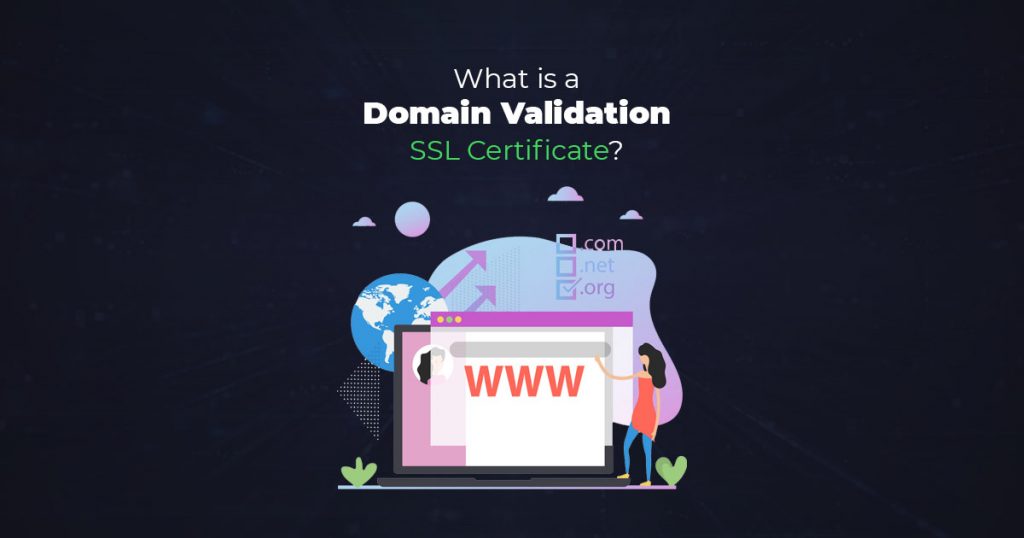When you research about SSL certificates online, you will see that there are different types of SSL certificates with different validation levels. For example domain validation, organization validation and extended validation SSL certificates. These certificates offer the same level of encryption but the validation requirements differ. Likewise, SSL certificates also differ based on the number of domains they protect. For example, wildcard SSL certificates, multi-domain SSL certificates, etc. It is important to be familiar with the different types of SSL certificates so that you will be able to get the right type of certificate for your website. This article explains the differences between the various types of SSL certificates available in the market.
Domain Validated SSL Certificate (DV SSL) comes up with 256-bit encryption and they are compatible with 99.9% web and mobile browsers. Website owners who only wish to validate their domains should adopt domain validated (DV) SSL certificates. A single Domain SSL certificate (DV SSL) can secure both www and non-www domains version.
Domain Validation SSL Certificates are most easiest to obtain
Domain Validation (DV) SSL certificates are easiest of all the certificates to obtain. There’s no manual identity check, only an automated verification that confirms the applicant owns the domain behind the website. If you have a personal website or blog, a DV SSL certificate is suitable for you. Organization Validation (OV) certificates take security up a level and require human verification of the organization’s identity. The same is true for Extended Validation (EV) certificates, which verify not only domain ownership, but business identity, legal status and address. The vetting process for the EV cert is more in-depth than any of the other certificates, thus EV SSL certificates instill a greater degree of confidence to customers who visit your site
How the process works?
The validation process for the domain validated (DV) certificate is pretty simple. Here, the user only needs to prove the domain ownership to the certificate authority (CA). SSL certificate authority can ask for email verification, file bases verification, or can check website’s web registrar’s information to validate the domain.
Email Verification – The certificate authority will send you an email on your email address with a confirmation link. You should open that email and click on that link by which the CA verifies your domain ownership.Make sure that the email address you have provided starts with admin, administrator, postmaster, hostmaster, webmaster. For example,
- File based Verification – In this verification process, the certificate authority will provide an HTML file (also known as Authentication file or Auth file) along with Hash data. Now upload that file on your server’s root directory. Once CA finds that correct file on your server, the certificate will be issued.
- Domain Registrar’s information – CA will directly verify the domain ownership via Domain Registrar’s information. Make sure that you have kept domain registrar’s information public. CA will reject the issuance request if they find domain registrar’s information to be private.
Who should purchase Domain Validation SSL crtificates
Small or medium level website owners who only wish to encrypt their domain should buy DV SSL certificate. Compared with organization validated (OV) & extended validated(EV) SSL certificate, the price of domain validated (DV) certificate is much lower.
Domain validation SSL certificates come up with alternative options such as ‘Wildcard SSL certificate’ and ‘Multi-domain certificate’. The wildcard SSL Certificate lets user secure the unlimited number of sub-domains whereas a Multi-domain (SAN) SSL certificate will allow the user to secure up to 100 multiple fully qualified domain names.
Reasons to buy Domain Validation SSL certificate
- Lower Price – The prices of the domain validation (DV) SSL certificates are on the lower side compared to the organization validated (OV) & extended validated (EV) certificates.
- Issued within minutes – Certificate Authority Issues domain validated (DV) SSL certificates within minutes once the domain verification process is done.
- No paperwork for validation – Certificate Authority does not ask for any documents during domain name verification process.
- Google Ranking Benefits – Google recently announced to give ranking benefits to the SSL enabled websites. So, a DV SSL will help you increase your website traffic which can definitely give a boost to your business.
- Increases user’s trust – HTTPS and website seal are trust indicators which let the users know that the website is secured and their information is safe.
From where to buy Domain Validation SSL certificate
A Domain Validated SSL certificate providers including the Certificate Authority such as Comodo, RapidSSL, Thawte, GeoTrust and GoDaddy offering domain validated (DV) SSL certificates at low cost. A user who wishes to secure his/her website can either go directly to CAs website or they can buy from SSLMagic. You can find the low cost ssl certificate from the SSLMagic as we offer a cheap domain validated SSL certificates compared to the CAs.
Key Features
- 2048-bit SSL Certificate signature
- Strong encryption strength up to 256-bit
- It is able to secure both www and non-www domains
- It is highly Compatible and works well with 99.9% of the web and mobile browsers
- It comes with Free certificate authority (CA) site seal
- Issuance is easy and can be done within minutes
- No paperwork , it is hassle free so no documentation is required for validation
- It provides Free phishing detection alert service . This is offered by few certificate authorities only
- During the validity period, it can be reissued as many times as needed.
- You can have alternative options such as Wildcard and Multi-Domain features
What does a DV SSL certificate look like?
Any website protected by a DV SSL certificate displays a small padlock and https prefix in the visitor’s browser bar. Although it’s not quite as eye-catching as the EV certificate’s green bar, it’s reassuring to those who know to look for it before sharing private details online. These signs confirm they’re on an encrypted site – and their data is safe.

